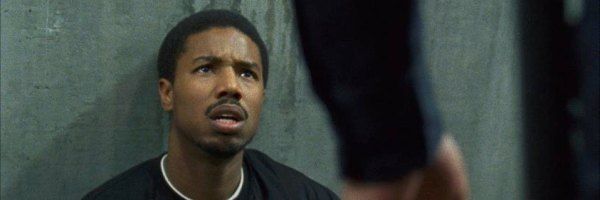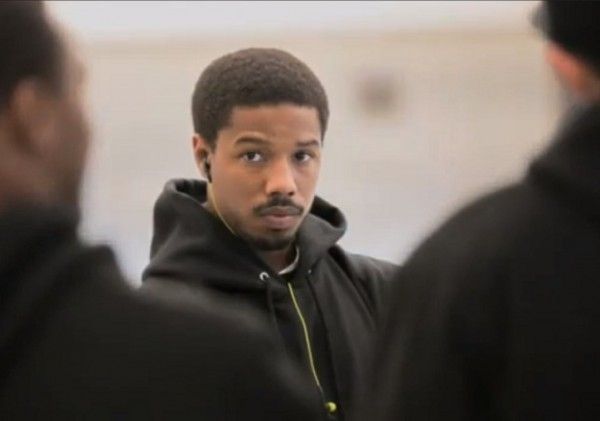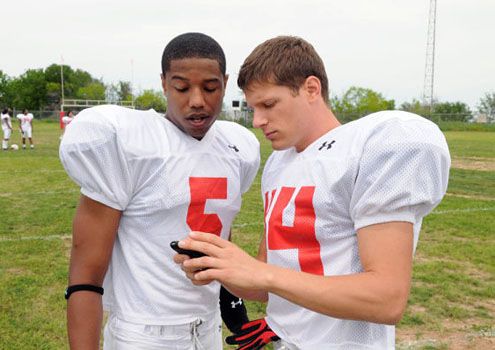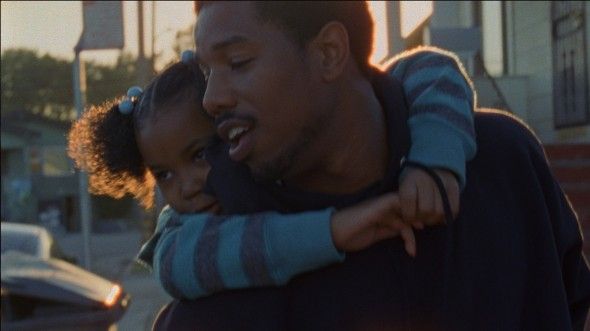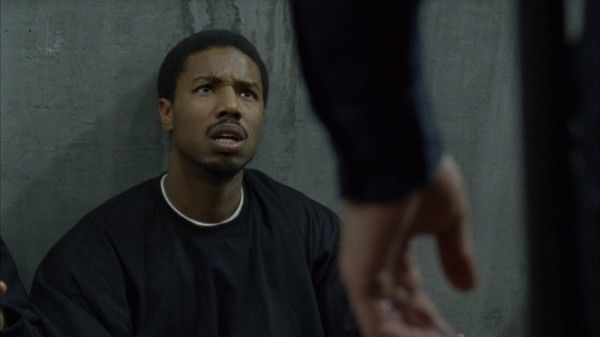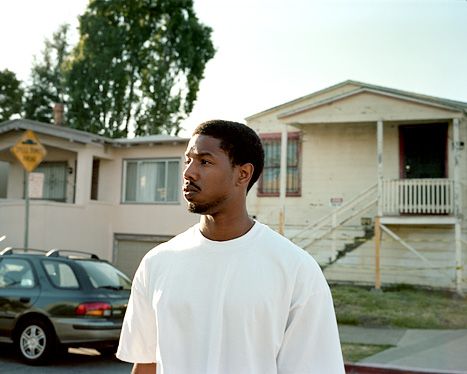One of the most truly stand-out performances of 2013 was the one Michael B. Jordan gave in Fruitvale Station, as Oscar Grant, a young man who was killed by a BART police officer at the Fruitvale BART Station in Oakland, California. With an Independent Spirit Award nomination and the National Board of Review Award, it’s no surprised that he was honored for his performance with a Virtuosos Award at SBIFF. Collider was there to cover and attend the event, and we’ve compiled the highlights of what he had to say, both on the press line and during the Q&A.
While there, Michael B. Jordan talked about how incredible the last year was for him, the pressure of bringing this real-life story to life, his personal reaction to the tragedy, the use of the real cell phone footage in the film, the most difficult scenes to shoot, what it was like to shoot where the real Oscar Grant was shot, and how the character has stayed with him. He also talked about how amazing it is to be able to reunited with Fruitvale Station director Ryan Coogler to make Creed, the proposed spin-off of the Rocky franchise centered on Apollo Creed’s grandson. Check out what he had to say after the jump.
Question: What has this last year been like for you?
MICHAEL B. JORDAN: The last year has been incredible. I’ve done a lot, seen a lot of people, and been to a lot of places. I’m just glad the film has continued to touch people, no matter who sees it.
Did the fact that this was a real-life situation that got a ton of attention bring more pressure to you for this role?
JORDAN: No, honestly, the most pressure came because of his family. Knowing he had a daughter and that his family members were going to watch this film, one day, was the biggest pressure for me, at first. It was a very personal story to me. I felt like Oscar Grant could have been me, or any one of my friends. And it was a story I felt I had to tell. I had to get it off of my chest, and I felt like it was the perfect opportunity to do that.
What was your familiarity with the story of Oscar Grant, and what was your reaction when you first heard what happened to him?
JORDAN: I remember exactly when it happened. I was at home on my computer and somebody posted the video on my Facebook wall. I remember watching the video probably more times than I should have, trying to figure out what happened before. What did this guy do to deserve to get treated like that and get shot? I took it very personally. I’m from the inner city in Newark, New Jersey, and he was from Oakland. We had the same relationship to a big city – I had Manhattan and he had San Francisco – that represents a bigger dream, and of getting out of that environment and doing something bigger than your circumstance. I just took on a sense of responsibility to play that role and tell his story, and give him a voice and give him a little bit of his humanity back.
You’ve been on three excellent TV series – The Wire, Friday Night Lights and Parenthood. What’s the one thing in your prior career that you feel most prepared you for this experience?
JORDAN: I think it’s the combination of a lot. It’s my life and my experience being an African American male, growing up very similar to Oscar. One wrong decision here, or a left turn when I went right, and I could have been in the same situation. I used to catch the PATH train on the way back and forth to Manhattan for auditions, for New Years, and for different events and holidays. I could have just as easily been stopped by a PATH train officer and held up, and there could have just as easily been a misunderstanding. And then, playing Wallace on The Wire, and all these characters that are, on the surface, sometimes looked at as very stereotypical, but they have the weight and the have the choices and the options, and they always seem to make the right choice.
Why did you think of director Ryan Coogler’s decision to begin the film with some of the real cell phone footage of what happened to Oscar Grant?
JORDAN: Fruitvale Station was 98% true. Ryan Coogler had the fortunate ability to have all of the documents and cell phone records, and he edited all the footage for the actual trial. He had the inside scoop for everything, and it was very true to what happened. And I felt it was a very strong creative choice to include that footage. You know how it’s going to end, but somehow throughout this man’s journey, you want his fate to change. You want to see him come out on top somehow. We didn’t try to glorify him, or try to make him seem like a saint or this perfect person. We showed him, flaws and all. I think there’s something powerful about Ryan Coogler’s work and the way he painted that picture. It was pretty awesome.
Oscar Grant’s demeanor could turn on a dime, and he could go from charming to menacing very quickly. Was that a particular challenge to play, and was it exhausting to play it like that?
JORDAN: Coming from the inner city, sometimes that’s your armor. Just us as people, we’re different around different people and in different environments. When I’m around my mom, I’m not swearing that often. When I’m around my friends, I’m a different guy sometimes. I think that’s just us as human beings, and how we are and how we adapt. And we really wanted to show the layers of how Oscar could flip on a dime. That’s who he was. I got a chance to get to know Oscar through his family and friends. I had a chance to sit down with his mom, his daughter and his best friends. I got a different point of view about Oscar from each other them, and I felt they were all true. It was important for us to show all those sides. And then, creatively, it was cool to show all of those sides in one scene. For me, it was definitely exhausting, but that’s the fun part. To be able to show that range and those different layers in a person, you don’t get the chance to do that too often. It was a challenge that I wanted to step up to.
Was there a scene that was most difficult to film?
JORDAN: There are two scenes that stand out in my head. In the morgue, just laying on the metal slab and knowing that nobody lives forever was difficult. You have those surreal moments where you think, “Oh, man, this is going to be me, one day.” That was a tough one for me. And then, just by the nature of the scene, when he gets shot at the Fruitvale Station. We only had one camera. We had four hours to shoot it. There were tons of extras. There was a range of emotion. That was just a combination of things that made it very tough and very emotional. It was a local crew. When you have everybody working on the same page and everybody has the same goal in mind, that’s when you get magic. That’s when you get something that really hits home. And that’s what we had. There were no egos.
And you shot that at the actual BART station where the shooting occurred. What was it like to shoot this movie right there?
JORDAN: I actually shot over the bullet hole. The bullet hole was still there, on the ground, and it was very intense for me to know that that was the exact spot this happened. Oscar Grant is still very much alive in the Bay Area. He’s been immortalized there, through this tragic event. And they were very, very supportive. Even to this day, when passengers stop at the Fruitvale Station, they won’t stand at that end of the platform, at all. They all know what happened there, and they just don’t stand down there. You just get a weird feeling. I get why they would be affected by that. But, the community has been supportive of Ryan Coogler and myself. They’re very proud of the film. I’m just glad I was able to immortalize Oscar, a little bit, and tell his story.
The scene where Oscar encounters a pitbull and is caring for that dog in its final moments got a lot of attention, but it’s also one part of the movie that didn’t actually happen. Why do you think that scene was added, and what did it mean to you?
JORDAN: We could have just as easily decided to tell his story from when he was four years old, up until that day. But the fact that we told it in 24 hours, and showed a day in the life of, you really get an idea of who a person is. If I woke up in the morning with you and went through your daily routine, by sunset, I should have a pretty good idea of who you are as a person and your characters. That’s what we really wanted to show with Oscar. Now, there wasn’t anybody around to record that event and say that actually happened, but African American males are looked at as America’s pitbull – vicious, left on the street to die, and with tons of stereotypes to us. Sometimes you’ve gotta hide the medicine in the food. You can’t slap somebody in the face with facts, all the time. It’s too harsh. Sometimes you have to tread those little meanings throughout out art to make it easier to digest. If I can get somebody to think, after watching our film, about how you treat people that you deem different, because you may or may not spend time with somebody like Oscar Grant, or even myself, then we did something special.
It’s been two years since you made this film, but how has this character stayed with you?
JORDAN: I’m going to be living with Oscar, honestly, for the rest of my life. It’s a very special project to me. I’ve built this relationship with his family, and that doesn’t go away after awards season. It’s gonna be there for the rest of my life. And I’m proud to should that weight. I don’t mind, whatsoever.
Do you like to use music to get into character?
JORDAN: Yes. Actually, during the pitbull scene, I listened to a lot of Bone Thugs N Harmony song “Crossroads.” I listened to that song on repeat, right before doing that. I had a best friend that passed away, back in 2003, and it was really rough on me, so I used him as a substitution for the pitbull. If I could have a guy walking around, following me with a boombox with my theme music, I would. Music just puts you in the mood.
What’s it like to know that, because of the success of this movie, you’re going to be able to reunite with director Ryan Coogler to do Creed?
JORDAN: Oh, it’s amazing! I can’t wait to get back to working with him again. We’re of our generation. He’s the same age as I am. For us to team up together and do it again on something totally different is pretty cool.

